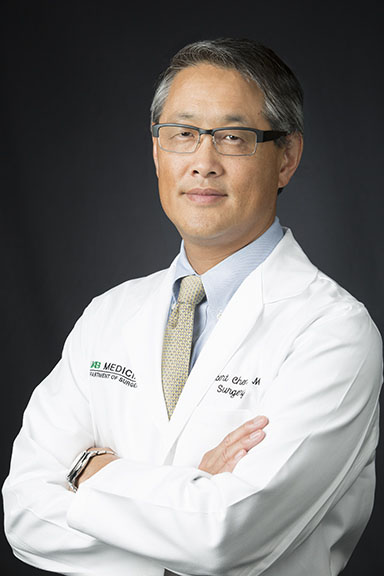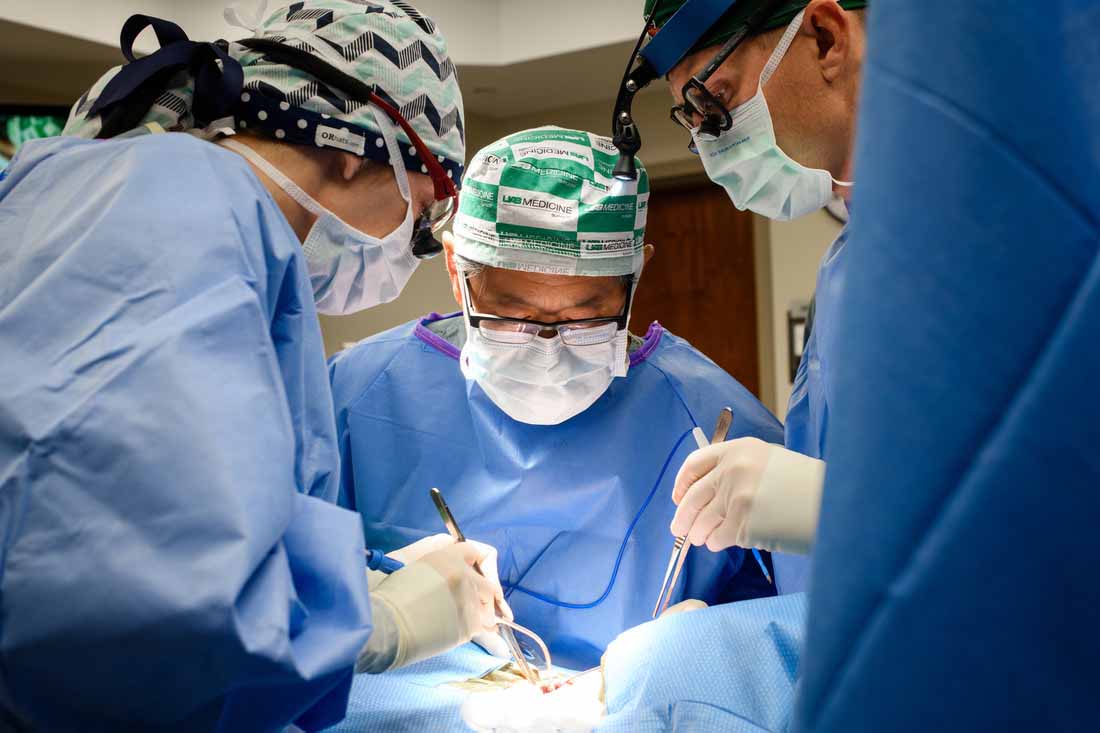 Each year, the month of May marks Asian American and Pacific Islander (AAPI) Heritage Month, which honors the unique legacies of AAPI individuals and communities throughout the U.S.
Each year, the month of May marks Asian American and Pacific Islander (AAPI) Heritage Month, which honors the unique legacies of AAPI individuals and communities throughout the U.S.
This year, the School of Medicine is celebrating AAPI heritage, lineage, and legacy by telling the stories of several AAPI faculty around campus.
To begin, one long-time faculty member shares his story of family, adolescence, and medical training in an honest and candid oration.
“Who Are You?” Chen’s powerful story of resilience
In 2019, Herbert Chen, M.D., FACS, Fay Fletcher Kerner Endowed Chair of the Department of Surgery, penned a presidential address that was featured in the first issue of volume 167 of the journal Surgery.
As the 2018-2019 president of the American Association of Endocrine Surgeons (AAES), Chen was asked to give a final address to the readers of Surgery, a research journal that also publishes papers from the AAES annual meetings.
In his address, titled “Who Are You?” Chen shared about his family history, experience growing up in rural Wisconsin, surgical training, recruitment to the UAB Department of Surgery, and the future of AAES.
Chen began by his address by weaving the story of his family through his parent’s immigration to the U.S. in 1964 from Taiwan. Unfortunately, Chen experienced microaggressions as well as outright racism in school, donning reprehensible nicknames such as gook, eggroll, swamp rat, and more.
Chen shared that many thought of him as a banana, “yellow on the outside, white on the inside.” These expressions of hate are experiences that no one should have to endure, but Chen said “all this teasing and taunting also made me tougher and gave me resilience.”
In fact, Chen stated that those experiences of hate have shaped him into an advocate for all underrepresented groups. Specifically, he is passionate about advocating for diversity, equity, and inclusion for medical trainees, in addition to faculty.
“Since I met Dr. Chen at Johns Hopkins, he has always exemplified respect, integrity, and compassion—indispensable traits in the most esteemed leaders,” says Selwyn Vickers, M.D., FACS, dean of the School of Medicine. “His guidance in diversity and equity for the Department of Surgery are critical to garnering lasting change in our entire enterprise.”
 Chen officially commissioned the Department of Surgery Diversity, Equity and Inclusion Committee in 2020, led by Vice Chair for Diversity, Equity and Inclusion Colin Martin, M.D., FACS. The mission of the committee is to understand, promote and respect diversity of background, culture, attitudes, and experiences within the department to drive excellence in clinical care, research, and surgical education.
Chen officially commissioned the Department of Surgery Diversity, Equity and Inclusion Committee in 2020, led by Vice Chair for Diversity, Equity and Inclusion Colin Martin, M.D., FACS. The mission of the committee is to understand, promote and respect diversity of background, culture, attitudes, and experiences within the department to drive excellence in clinical care, research, and surgical education.
The increasing rise of racism exhibited through verbal harassment, discriminatory practices, and physical violence against the Asian American and Pacific Islander (AAPI) community–fueled by the racist terminology used to describe the origins of COVID-19–are a stark reminder that prejudices against the AAPI community still exist.
A recent article published in the American Journal of Surgery and co-authored by George Yang, M.D., Ph.D., professor of surgery, highlights that although racial justice towards AAPI individuals has improved in recent decades “… many Asian Americans have never felt fully accepted in American society and continue to be treated as perpetual foreigners. As anti-Asian sentiment and hate crimes rise in the wake of the COVID-19 pandemic, this perception has become reality.”
Asians, Asian Americans, and Pacific Islanders are a significant part of our healthcare work force serving on the frontlines, but are still subjected to persistent bias and stereotypes. Chen says a pillar of the Department of Surgery is the commitment to diversity, and “we strive to create a safe and nurturing environment for everyone regardless of race, ethnicity, gender, sexual orientation, religion, or country of origin.”
The Department of Surgery encourages all UAB School of Medicine faculty, staff, and trainees to denounce all forms of racism, not to be silent during conversations that promote racist stereotypes or Sinophobia, and stand up for all minority populations that suffer stigmatization.
“I stand with Dr. Chen in denouncing all forms of AAPI racism, microaggressions, stereotypes, and bias. We must continue to foster an academic medical university and hospital that is inclusive, diverse, and equitable,” Vickers says.
Read Chen’s full article in Surgery.
Stay tuned for more stories from the School of Medicine on AAPI heritage throughout the month of May. For AAPI resources and learning tools, visit the UAB Office of Diversity, Equity and Inclusion to learn more about bystander intervention, allyship, and more.